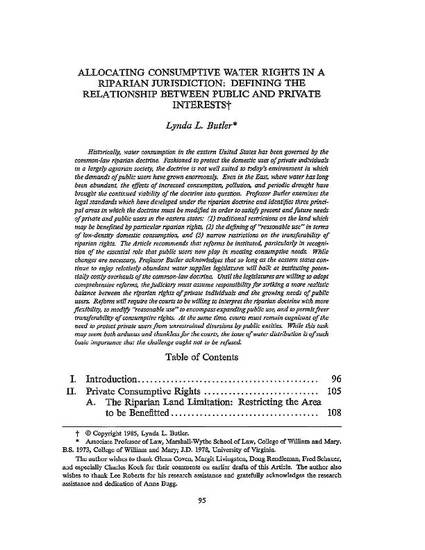
Historically, water consumption in the eastern United States has been governed by the common-law riparian doctrine. Fashioned to protect the domestic uses of private individuals in a largely agrarian society, the doctrine is not well suited to today's environment in which the demands of public users have grown enormously. Even in the East, where water has long been abundant, the effects of increased consumption, pollution, and periodic drought have brought the continued viability of the doctrine into question. Professor Butler examines the legal standards which have developed under the riparian doctrine and identifies three principal areas in which the doctrine must be modified in order to satisfy present and future needs of private and public users in the eastern states: (1) traditional restrictions on the land which may be benefitted by particular riparian rights, (2) the defining of "reasonable use" in terms of low-density domestic consumption, and (3) narrow restrictions on the transferability of riparian rights. The Article recommends that reforms be instituted, particularly in recognition of the essential role that public users now play in meeting consumptive needs. While changes are necessary, Professor Butler acknowledges that so long as the eastern states continue to enjoy relatively abundant water supplies legislatures will balk at instituting potentially costly overhauls of the common-law doctrine. Until the legislatures are willing to adopt comprehensive reforms, the judiciary must assume responsibility for striking a more realistic balance between the riparian rights of private individuals and the growing needs of public users. Reform will require the courts to be willing to interpret the riparian doctrine with more flexibility, to modify "reasonable use" to encompass expanding public use, and to permit freer transferability of consumptive rights. At the same time, courts must remain cognizant of the need to protect private users from unrestrained diversions by public entities. While this task may seem both arduous and thankless for the courts, the issue of water distribution is of such basic importance that the challenge ought not to be refused.
Available at: http://works.bepress.com/lynda-butler/4/
